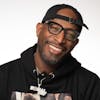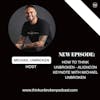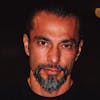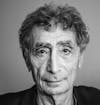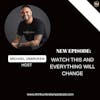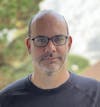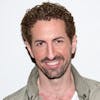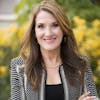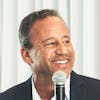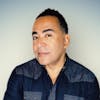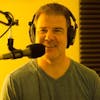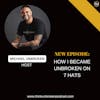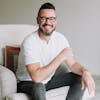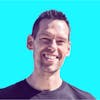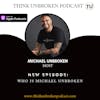The Power of Personal Transformation and Inspiring Stories of Trauma Healing Journey
Join us in this inspiring episode as Michael and his guests, Dr. Ruth Allan, Jaime Greene, Dr. Caroline Leaf, and Kelly Gores, explore the power of personal transformation... See show notes at: https://www.thinkunbrokenpodcast.com/the-power-of-personal-transformation-and-inspiring-stories-of-trauma-healing-journey/#show-notes
Join us in this inspiring episode as Michael and his guests, Dr. Ruth Allan, Jaime Greene, Dr. Caroline Leaf, and Kelly Gores, explore the power of personal transformation and healing.
Dr. Ruth shares the physical and emotional toll her previous situation took on her and the signs of growth she experienced through coaching. A significant turning point was when her success in a challenging military environment contrasted with her struggles at work, highlighting the importance of being true to oneself. Jaime shares her journey toward forgiveness, driven by her Christian faith. She offers profound insights into healing and personal growth. Dr. Caroline Leaf explores the idea that trauma often involves a loss of identity, leaving individuals feeling stuck. She explains how understanding the distinction between the mind and the brain empowers people to rewire their brains and manage their thoughts effectively. Kelly introduces the concept of epigenetics, emphasizing that genes are influenced by lifestyle, environment, and perception. She discusses how our body's symptoms act as signals of imbalances, advocating for addressing root causes rather than symptom management.
Throughout this podcast, our guests offer valuable insights into personal growth, resilience, and the transformative power of the mind. Tune in to discover how you can unlock your potential for positive change and healing in your own life.
************* LINKS & RESOURCES *************
Learn how to heal and overcome childhood trauma, narcissistic abuse, ptsd, cptsd, higher ACE scores, anxiety, depression, and mental health issues and illness. Learn tools that therapists, trauma coaches, mindset leaders, neuroscientists, and researchers use to help people heal and recover from mental health problems. Discover real and practical advice and guidance for how to understand and overcome childhood trauma, abuse, and narc abuse mental trauma. Heal your body and mind, stop limiting beliefs, end self-sabotage, and become the HERO of your own story.
Join our FREE COMMUNITY as a member of the Unbroken Nation: https://www.thinkunbrokenacademy.com/share/AEGok414shubQSzq?utm_source=manual
Download the first three chapters of the Award-Winning Book Think Unbroken: Understanding and Overcoming Childhood Trauma: https://book.thinkunbroken.com/
Join the Think Unbroken Trauma Transformation Course: https://coaching.thinkunbroken.com/
@Michael Unbroken: https://www.instagram.com/michaelunbroken/
Follow us on TikTok: https://www.tiktok.com/@michaelunbroken
Learn more at https://www.thinkunbrokenpodcast.com
Support this podcast at — https://redcircle.com/think-unbroken-with-michael-unbroken-childhood-trauma-cptsd-and/exclusive-content
Advertising Inquiries: https://redcircle.com/brands
Privacy & Opt-Out: https://redcircle.com/privacy
Support the Podcast: Become a listed sponsor!
Follow me on Instagram @MichaelUnbroken
Learn more about coaching at https://coaching.thinkunbroken.com
Get your FREE copy of my #1 Best-Selling Book Think Unbroken: https://book.thinkunbroken.com/
Transform Your Brain for Better Mental Health with Dr. Ruth Allan
Michael: So, what happened in your life in that moment that actually inspires you to create change? Because I think that happens, that happens to a lot of people and nothing comes from it. But why were you inspired to do something different in that time?
Dr. Ruth: Well, that's a really great question because I actually joined the firm that I work worked for because I was previously an entrepreneur running my own business and I thought, do you know what? I wanna see the different side of the fence and see what it's like being an employee. And I joined the firm specifically to do per get personal development opportunities and get all the training and experience that the firm offered. And actually, that point when I was told I had no emotional intelligence, I reached out to the firm and said, well, I'd like some coaching, please to help me. And they said, oh no, I'm really sorry, you're not the right grade to get coaching. And I was like, oh, okay, that's an interesting thing. So, I had to write my own performance plan, get assessed against the performance of my own performance plan to prove that I had could perform better and they wouldn't give me their professional coaching support. So, I thought to myself, you know, I've got control because I have my own business previously and I have the power to get the support that I need. And so, I paid for the coaching myself, the professional coaching that I wanted to have, and I started with a business coach who really kind of focused on the business issue, which was this performance review. And he was a really great coach and he helped me realize it wasn't me, the firm, you know, there were a lot of moving parts beyond just me as be being the problem and reaching out to a high-performance coach; my coach was Diane Shrock, who was part of the High-Performance Academy, she's actually emotional intelligence coach and she quickly helped me realize that it wasn't just me, it was the system that was broken and that's how I pulled myself out is taking back control and not allowing people to steal my own personal power, which is what they, in essence had done in the corporate space, is I wasn't able to be myself. You know, I got told, oh, you're too rough around the edges, I said, I was likened, I was an oval and I needed to become a circle. And it's like, well, stars don't fit in circular holes. You don't wanna get rid of the spot, you know, the pointy edges cuz you want that start to shine brightly if you think about back to your kids, kids gains and that you know, I might be a bit pointy and I might be a bit rough at times and a bit direct, but that's me and that's just the way I am and yes, I have softened of course cuz I've been through this coaching journey and I've looked at myself in the process. But I think the core thing there was that I wasn't able to show up as me it in that company, it was diminishing me and so taking back control of who I was and who I wanted to be and where I wanted to go was always there and I'd just given it away as being part of that entity of that firm.
Michael: And so many people do. You know, you're not playing the game. Right? And that's kind of what it is, I must have gotten a bazillion performance reviews working corporate before I went on my own and started my own businesses. And I got kicked outta team meetings, I would get kicked out of, like, people would be like, if you say one more thing, like you're outta here, and I'd be like, yeah, but you guys don't get it, here are the answers, here are the things that make sense. And look, I'm not gonna say sometimes I wasn't wrong, cuz I assuredly was but you know, to work for companies where you're not valid and I don't even know if necessarily validated is the right phrase that I want to use, but to work for companies and corporations in which you are not appreciated, like for your words and you're given the space to speak up, which is the entire point of working for a company. Yeah. You gotta dip because that's gonna end up really bad and that's obviously what happened for you. And so, you're in this transformation, you're seeing the impact that coaching is having on your life, I can relate to that entirely there's a huge reason why I am a coach today. And in that, what starts to transform in your body, in your mind, in your spirit, in your energy? Like what are some of the telltale signs of growth for you in this?
Dr. Ruth: So, I think the biggest shift for me was, so the obvious one that was really rock bottom when I started was energy, which is really what I focus on in my coaching now. So, my energy at the time was rock bottom…
Michael: And energy defined that, please.
Dr. Ruth: So, being able to get out of bed in the morning, you know, was one of the first things when you're in a really dark place. I was just sick all the time, you know, I was sick with sinus problems. I was always crying all the time. I was exhausted emotionally. I exhausted physically. I was exhausted mentally just because of all of the rubbish that I was having to deal with in the firm. And you know, and I was exhausted spiritually cuz I wasn't doing what I was passionate about. And the big shift that started me realizing, do you know what, this is not me, this is the firm was when I would, at the time, I'm in the military as a reservist this is not the firm, this was a separate thing, but I'm a military ski instructor and I was asked to lead the team of people in the Alps teach them skiing and that's part of my reservist commitment. When I was doing that, it was a really stressful environment, really complex personalities, and I did perfectly fine. I was the only instructor on the trip, which is very rare and I did totally fine doing all of that and delivered it, you know, exceptional results. And everyone was super happy and pleased with me and I couldn't have been put in a harder, harsher environment white out all the time, diverse range of experiences, and I performed at my best. And I wasn't stressed, I wasn't flustered or anything, but as soon as I put myself back into the work environment that I was in and exposed to, I just turned into a crumbly mess kind of thing. I just didn't wanna be there it was like this flight thing. And so, it was a real sign that, do you know, it's how important your environment is for you to flourish. And once I realized that it wasn't just me, it was the toxicity of the environment and that includes people that really allowed me to shift the lens, to putting the power back into myself and knowing that, do you know I can own this? I've got this. I know I've got it. There are examples of how I can do it, and I can pull myself out of this rut. And that really started me on that trajectory. And then the second one was when I went to the High-Performance Academy live in the state, when I decided at the academy that this was my time to train as a coach, as a high performance coach at that time. And I was gonna hand my notice in at work cuz it was just not serving me and go back to being an entrepreneur, which was what I loved. And as soon as I got back, I handed my notice and served my term, which was unfortunately a bit longer than it is for you guys in the States but then left.
Michael: Yeah. Is that when you got into that training, is that HPX? Is that Brendon Burchard's?
Dr. Ruth: Yes, it is.
Michael: Yeah. So, Brendon is actually what I would call my original mentor.
Dr. Ruth: Oh, is he?
Michael: A hundred percent. Like without that dude, I would not be here right now. And so, you know, it's really interesting that when you look at and you understand all of the things that create high performers, it's really never anything about money, it's never about accolades, it's never about accomplishments. It's about how you show up as yourself every day like are you in your habits that make your life better? Are you assessing yourself like his HPX journals unbelievable. I stopped using it because I feel like I'm really in tune with myself these days. But you know, four or five years ago it was awesome, awesome thing that I did. And I think that people who will get into coaching or find coaching will find that, that Brandon is like the OG in the game. There's a lot of people doing it, but like him, Tony Robbins, like I always kind of go to those guys first and foremost. So, I resonate a lot ‘cuz he's played a massive role in my life. One of the things that I'm curious about, so as you're going through that, like being in person in that environment, which I know has just gotta be like mind melting, right? Like what is happening in real time? Because I think like a lot of people are like, oh, I'm gonna go get a coach, or I'll go get a coaching certification and then everything's gonna be different. But like, there's steps, there's progress, right? When you're here and you're witnessing and you're looking at it and you're like, there's opportunity here like what is actually going through your mind that's leading you to, I'm gonna go quit my job.
Dr. Ruth: Yeah. So, I think the first thing you know, one of the first sessions we did with my coach, which is the first session you do when you do the high performance coaching program is to get clarity and you know, I was all over the place in terms of where I was, but I had quite good clarity as to where I wanted to go and what I wanted to do. And you don't have to have the supervision in your mind, but it's helpful to know, okay, by the end of this week, this month, this quarter, this year, this is what I want my life to look like and this is where I want to be. And just kind of really visualizing the struggle which Brendon talks about as you honor the struggle, it is visualizing that, you know, it's not gonna be an easy road, it's gonna be bumpy, it's gonna be rocky, you're gonna fall over but just keep going. So, I think the big one for me was just doing the clarity initially energy, as I said, was rock bottom when we did the energy session. And so, there was a huge focus, as you said, on my nutrition because I was comfort eating, you know, at the time when I was at the firm, I was drinking copious quantities of wine in the evening to numb the pain of the situation. I was eating deserts, like there was no tomorrow I'd have a double, double latte in the afternoon with double shot of coffee to get me over the energy slump in the afternoon. And that would be coupled with a brownie. So, you know, had all the really bad enjoyable obviously cuz it is a nice quick fix, but as a long term pain, eating habits that I had to turn around.
Discover the Power of Self-Care with Jaime Greene: Insights on Healing, Boundaries, and Taking Control of Your Journey
Michael: You and I are in a different spectrum, right, because you know, you're thinking this way as a kid, I want to be good, be a good person, honor society, playing sports, all that stuff Me, I'm like breaking the houses, stealing cars, running from the cops, you know, hooking up with girls like it's really just chaos, right? What started to happen in your life?
Jaime: Yeah, that's a great question. It's so funny ‘cuz my sister probably took the path that you took and I took the opposite path in responding to crisis in our lives. And so, when we moved, the first thing that happened, you know, we sold the house that I grew up in. I reconciled with my dad because in my mind I thought, well, I'm moving to California, I don't know when I'll see him again. And if something ever were to happen to him, I wouldn't wanna hold a grudge with him. I would want him to know I forgave him. I think I had come to meet the Lord, like I became a Christian and it was one of those things where I was like, I don't want to live with unforgiveness and having unreconciled relationship with my dad, like I loved my dad and it pained me that for that long I held a grudge with him. But it was almost like my way of having power over the decision he made to like, I'm gonna withhold myself from you because you made this decision that disrupted and divided our family. And then I was like, that's silly. I'm not gonna hold that over anymore and then we moved to California.
Michael: But before you go there, I have a question. Because when I was a kid, and I think so many people deal with this when they have moments of heartbreak as children. We become resentful, we push back, we put up gigantic walls obviously you did for a period of time. But then to get to that place where you're like, I wanna reconcile this, like, those kinds of words did not exist in my vernacular as a kid. I was like, how the fuck do I burn this house down? Right. And so, what I'm wondering is, where did that come from for you? Like, is that innate? Is that a part of like the Jaime DNA? Because I'm sitting here like, I wanna throw a brick through the window and you're like, I'm gonna go and sit down and have a conversation.
Jaime: Yeah. You know, I do think it was partly because I became a Christian at that moment, like in that junior high phase, like for as much as I knew what it meant to be a Christian, you know, accepting the death of Jesus on the cross for my sins and my wrongdoing. And so, that I think is what really prompted inside of me that I can't hold unforgiveness towards him like if I am going to identify as a Christian and believe in that. For me, I couldn't hold unforgiveness towards him, I couldn't hold on forgiveness or any anger or I never was really bitter towards my biological parents. I actually more or less felt it like, what a gift, but also how hard, I mean, that's a whole another story, whole another podcast of all that stuff. But it just was one of those things, like I just, I don't know what made me do that, but I would say it was just my faith in God that I couldn't call myself a Christian and then be like, I'm forgiving towards my dad.
Michael: Yeah. That makes a lot of sense. It took me a long time to get to forgiveness I mean it, and even now I think about it in a magnitude of ways. One of which is in part, I think to some extent in its contextual, obviously I think there are some areas in forgiveness in which it must be earned and not just allotted. And I think for me, that comes in relationships and reconciliation and a lot of those things ‘cuz you know, it's one thing to be like, I forgive you and then the same thing happens again that I played that game with my mom for, you know, my entire childhood. And then there's the other forgiveness where it is for you because it's like if you're carrying that backpack of bricks with you everywhere you go, it weighs you down. And it's not just the forgiveness of other people, but like you have to forgive yourself too. And you know, because name a mistake, name a terrible thing a human being can do outside of killing someone, I've probably done it right, but I've been able to go and stand and look in the mirror, be okay with the reflection on the other side, love myself as is, and just say, you know what? Like I'm human having a human experience and guess what, I'm gonna screw up again like, it's only inevitable, right? It's coming. And so, that's so astute of you to be that young and obviously having, you know, I think we fail to look at mentors we have in our childhood as you know, even the kid who's a senior in high school, right? Or even the church leader or whatever it might be for you. And I imagine there just must have been some people who just spoke into you in a really powerful way.
Jaime: Absolutely. You know, I played competitive fast pitch. So, I had coaches, I had friends, my parents, we had good friends, they were all there and supportive and everything. So, I mean, it definitely wasn't just this like profound thing that happened in my life, just out of thin air. But there was a community of people that were there and supportive in a very, I don't know what the word I'm looking for, they didn't realize the impact that they were making on my life to make me feel like I mattered or to keep going. And so, you know, my dad and I, we had those hard conversations and I was able to express the decisions that he had made and how it hurt me so deeply and he apologized and he asked for forgiveness. So, it wasn't like I just gave it to, but there was an exchange of that. And of course, I apologized for how disrespectful and how I was with him and so it was this moment of release and it almost wants to bring me into tears right now, but it was just one of those things where it's like it pained me to hold that against him if for any longer like I just didn't wanna do that. And so, because I was moving from Washington to California with my mom and her new husband, who we did not know, we didn't know him very well. My sister ended up staying with my dad, my brother and I moved down to California, my older brother was out of, you know, graduating, getting married and everything so he is doing his own life. But we moved to California and we didn't know anybody and I was a fresh, I was considered a freshman. So, I went from a junior high of like maybe 400 people into Santa Monica High School with it had 2200 kids.
Mastering Your Mind: Neuroplasticity and Healing with Dr. Caroline Leaf
Michael: What I'm curious about is as people are going through this it dawned on me probably within the last year like so much of what trauma is, it's not the abuse, it's not what happens, it's like the theft of identity and what I've discovered healing and coming through this process now working with so many people around the world it's like that's the thing we have to recapture but I fear Doctor Leaf that people are just quote unquote stuck and because of that stuck they can't seem to go into the doing. So, for those people like where are do you start when you're in this place like, I'm stuck, this is my identity, this is who I am?
Dr. Leaf: Now really glad I just started there Michael because it's a very really good point and what I believe a lot of the stuck come from is not understanding how to be rewire the brain and understanding things like what is the mind, what's doing the work we talk about getting through our stuff, what does that actually look like? You know, who's doing the getting to the stuff which part of us is doing that and that's when you start understanding those kinds of concepts it then gives you the power to get unstuck, you're getting empowered to change. So I've shown with my research when you start understanding the power of the mind and you know what can we cancel that statement because it's overused when you start understanding what it means to be alive what it means to think and feel and choose, when you understand that and when you understand how you can drive that, that you can actually control the messy of your life and then it's okay to be messy but this we just need to learn to manage that, that's when you become very empowered and I showed with no research that you can actually get things like the depression and anxiety which can be so incapacitating and which aren't illnesses they're warning signals but they are warning signals that incapacitating but you can get those under control by effect eighty one up to eighty one percent which is phenomenal without drugs. Any kind of fancy tricks just pure mind management and then that's where I have worked in for these years. So, yes, we get stuck without the understanding so, it begins with understanding what the mind is what the brain is I gave a brief explanation in the beginning and then it goes into how do we manage this process, how do we construct and reconstruct and what do we do. So, here’s a little model of a brain and it's most people think the mind and the brain are the same thing. People will talk about them and it's totally understandable because that's the language for the last forty years, language has been very much around the brain and the mind as though they the same thing. We also get so many messages through the media that the brain is producing the mind, the thoughts come from the brain and that's not totally accurate because if you did nothing happens with your brain just disintegrate.
So, there's a huge difference between you and I having conversation and the views and listeners and someone who's did because we are able to actually listen to each other and think and feel and choose which are the three actions of the mind, think, choose, feels and think, choose it's an ongoing four hundred operations per second cycling that helps you to actually process and experience like this discussion like everything you have in life and process that puts it into the brain so the minds reactive the mind you talk ability to think and choosing and we have this ability to interact with life, we take that through thinking feeling and choosing that's kind of the currency we put that into the brain as a structural change and that thing changes things a message to the body and that's why it's stored in the body and we can talk a bit about that with PTSD and complex PTSD. And then that combination of mind, brain, body then produces you, so it produces what you say, what you do, how you show up. So, we take back process and we look at okay, how am I showing that, I'm showing up stuck? I'm showing up stuck, I'm doing the same things, the same patterns, the same things over and over.
So, now we needed realized okay, we’ll let me look at that pattern object to be, let me stand back and observe myself and give myself grace and first say to myself, it's okay to be a mess, it's okay to be stuck, that's okay, that's how you're showing up, that’s not who you are, that's not your identity even though may feel like your identity, even though you may feel like you've been stuck for years and years and the same thing that you wanna say things like this is who I am. It's not actually who you are, it's who you are at the moment because of, is it because of this massive because of behind that know your childhood trauma was a massive, because of that you know produced your initial part of your life which then you know you got to point where you shifted and changed, so you thought you are reacting to life because when we have things happen to us, we try and cope. And sometimes it's just so painful for like you experienced that we wired toxic coping mechanisms into our brain.
So, in an experience is wired into the brain and toxic weight looks like there's wire treat all the pro teams mis folded and everything's all weird and wrong versus a healthy experience this discussion is that is a healthy thought that your growing, this would be a toxic thought and this impacts how you function and it's a coping make it's this the experiences in the roots like anything starts with a roots, grows this thing grows into your how you see yourself in this collection how you're showing up and it whatever this is whatever the story is which in your case was all that told me experience as a child showed up and it wouldn't have just been one it would have been multiple of these.
Unlocking Your Body's Healing Potential with Kelly Gores
Michael: And I think we're often driven by this idea like, oh, there's just thing I want to talk about this story that I want to tell, but we kind of get stuck in held back due to the fear of possible repercussions that come with this. And I recognize and I understand that on the backside of you, creating what was a practical and really empowering film for me, there were a lot of people who, like, who does this person think they are? What are they talking about this is nonsense, blah, blah blah? How do you step into this place where you're willing to confront that and say, you know what, my message and my story is worth, whatever comes along the backside of it?
Kelly: Yeah, great question. I anticipated a lot more kind of scrutiny and push back than I received so that was kind of odd. I think that leading up to it, you know, actually this the movie, The Secret was one of my kind of initial seed planters of doing this film because it was a film that not particularly my documentary style, but I took these nuggets away that I applied instantly in my life and within months’ weeks my life changed and I was like – wow! It is all energy and what we put out there we do get back and it just opened my eyes and I applied it and I was very empowered. And so, around the same time, as I watched the secret, I started meditating, I was going to Agape, and I was listening to Michael Beckwith, I'm sure, you know, him, he teaching and he was just empowering me like – we're co-creators with life, and if we get a calling in our heart, within every acorn as an oak tree within every dream, is everything you need to see that dream realized.
If you have a calling to be an actor, if you have a calling to be a poet, if you had a calling to be an astronaut, that means that life, nature, the universe, God, whatever you believe puts that calling, there, you have the ability to see realize.
So I was acting at the time, and I've been acting my whole life, I grew up in Southern, California, and off and on because it's just a tough business. You're getting rejected all the time and I actually initially started seeking out healers to, like – remove the block so, I would be a better actor and just be free unless self-conscious. And so like around the same time, I started listening to Michael's teachings, practicing my gratitude work, and seeing you know, crazy manifestations occur and just my life feeling better and I really got these concepts that we are co-creators. So and then I started meditating at the time so that that really rooted everything down.
So all of that to say, once I was ready to do the film I just had complete trust that this calling in my heart, and the reason I brought up acting was that I started getting more excited talking about manifestation and healing and epigenetics, and we have so much more power than we've been led to believe and is a world of infinite possibility. I started lighting up talking about that and less so talking about acting something that I thought I wanted to pursue my entire life and so I paid attention to that.
And once I was ready to do the film, it took about eight years marinating, this idea and gathering more research, and more experts and once I was finally ready to do it, I was just like, you know God take the wheel, you put this calling in my heart, it is very strong. So I'm just going to trust that, it's all going to unfold and I'm just going to say yes and keep moving forward and let you take care of the hard stuff.
Michael: Yeah, and I think that's so much of the human experience, right? We all have dreams, we all have ambition, we have goals, but the reality in and I think one of the biggest misconceptions that people have about creating your life is like, you actually have to do some stuff, like as much as I love meditation and journaling and it's a part of my daily practice. I know that those things are simply catalyst for me to figure out like, okay, cool. Now I have a better and more fine-tuned understanding of what it is that I'm going to have to do to make this dream, idea, a vision come to fruition.
When you're in this and you're starting to build this out in your learning and your growing and you're like, okay, this is the story that I want to tell, I think that a big part of it as we subconsciously fight ourselves, right? And we're in this place where, all right, I have this idea, have this dream but who am I to tell it? How do I do that? Why me? Was that a part of your narrative in this as well? And if so, like, how did you combat that?
Kelly: Yes, for sure. I think we all have that like, moments of impostor syndrome. I now have a very successful film and a book and a podcast and a platform and I still question like, who am I to be this like wellness expert. I still have human flaws. I still get sick. I overdo it or we're evolving, it's an ongoing process of healing, healing will stop, will be healing up until the day we leave this physical body. So absolutely, and again, I love what you said, it's like we have these daily practices, but we, it's all to stay grounded and have that clear communication between our kind of higher self, our guidance, spirit, whatever you want to call it to then get clear on what action you need to take. So, again, it was just like, it was such a strong calling in my heart, it was such a clear vision people kept coming up to me and saying, how are you so happy? How are you so healthy? What do you eat? What do you do? What's your workout? And so I literally was like, well, I can't I'm just going to put all of the people that empowered me into a film and it's still strange to me that it was about healing because again, but I just was like, there's so much more than just taking a pill to manage a symptom.
We can do extraordinary things if we're just given first the awareness, then the tools and then the examples of possibilities. So inspiring stories of other people who did extraordinary things. So I just really trusted that passion pull and my heart and I think it was a big, because Michael Beckwith is so inspiring. He's up on the stage and he's like, fire and me up, I'm like, yeah, I can do this. So it was just that perfect storm of inspiration support and I've always been of a risk-taker, I played three Varsity Sports. I'm a competitive athlete, you know, I want to push myself to see my potential.
So, that was the last factor was just like, I'm just going to do it and I'm going to do see where it goes. I'll jump, I'll take the leap.
Michael: Yeah, and so much of it is taking the leap and on the backside of that leap because what I think about all of the time, like, if you face your fear, on the backside of being willing to face that like greatness awaits you or at least a really cool a story, right? And so, I think about that all the time and one thing in my healing journey, not only from the traumatic experience of my life but the physical healing that my body went through, was really recognizing that there is a part of your body which when you understand biology, the number one thing is our brain is designed for is survival. So, what does that mean? You have to be able to heal, you have to be able to continue to be resilient. What I'm curious about those if you'd be willing to dive in and talk a little bit more about the human body and the way that it is designed to in every moment, right? Be able to look at disease and symptoms as feedback and ways that we can kind of step into the healing process and yet somehow in that we still seem to intend to get into our own way.
Kelly: Absolutely. So, just a few like pillars that, I think might change someone's perception. If this is the first time they're hanging out of it, is the signs of epigenetics. So we've been told for, beginning of time our whole lives that we are victims of our genes or were subject to our genetic code, and to an extent, this is true, but what we learn with the science of epigenetics and Bruce Lipton is one of the pioneers in this field as a stem cell biologist. He discovered that it's actually environment that turns genes on and off. So, genes are like little switches, our genetic code is a blueprint, but then it's our lifestyle choices, our lifestyle behaviors, the diet that creates an environment within the body. Literally, our physical environment around us, if there are toxins, if there's nature, fresh air, polluted air, all of that, will create an environment or outside of us, and then our perception of the environment. So, we have this brain that from the age of 0 to 7 years old, this brain is just like a computer, that's downloading software programs from the people around you. So usually your parents or your grandparents, the people that are raising you, your teachers, and you're just, like a sponge, picking up the behaviors, and learning how to survive in the world by paying attention to the people around you.
So, when we talk about, oh, it's genetic. Well, a lot of these genetic expressions are because you have the same pattern of diet, environment, behaviors, beliefs about life, those subconscious programs become your belief system and they're kind of downloaded into you between the ages of zero and seven, they're not even your beliefs you’re just adopting them from other people, so and then they color the lens through which you look at life. And the best example of this is if you are raised a snake charmer in, let's say India and you were taught to be around snakes and how cobras or whatever, I'm just making this up I know nothing about sinks Army. If they are signs of a good omen and power and it's actually a blessing, if you get bit or whatever the story is, you're going to have a very different experience in your body than someone who is afraid of snakes, you're walking down the path, one person sees a snake and has a flood of oxytocin and joy because it's the good omen they've been asking for, and they're not afraid of the snake and the other person is going have stress chemicals and adrenaline's person through their body. So based on their belief system they have two completely different biochemical reactions in their body.
And so, our subconscious beliefs absolutely always need to be addressed when you are doing any kind of healing because they're just this, their subconscious we're not even aware that this lens is coloring our life and attracting people circumstances, etc. to give us feedback as to, what we're believing about life.
And then the final component of that you talked about symptoms and physical disease. You know, our symptoms are your body telling us that there's an imbalance, so whether it's a skin rash, with it's a pain in your neck, whether it's appendicitis, whatever your symptom is, that's giving you feedback that there's something off and Western medicine tends, to give you immediate relief by silencing that symptom by steroids to get rid of the rash, you're basically taking away the feedback. It would be the same as if your house starts to get on fire, the smoke alarms going off because the smoke is billowing up and that smoke alarm is really annoying, it's really painful, it's itchy but instead of putting out the fire, you just take out the batteries of the smoke alarm so you don't have to hear that feedback. And so as we understand that, we know that, we may have to take the batteries out just so we can have sanity while we're putting out the fire, but if we never put out the fire, we're just going to have to keep, we're never going to really heal, we're just managing disease through symptom management.
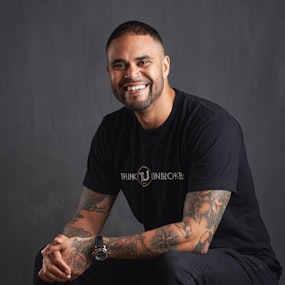
Michael Unbroken
Coach
Michael is an entrepreneur, best-selling author, speaker, coach, and advocate for adult survivors of childhood trauma.
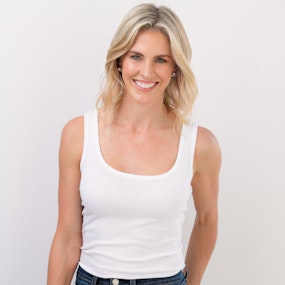
Kelly Noonan Gores
Writer/Director/Producer
Kelly is the writer, director, and producer of HEAL, a documentary feature about the mind-body connection and our body’s innate ability to heal. She also authored the follow up book HEAL and is host of the new HEAL podcast. A Los Angeles native, she grew up in front of the camera acting on and off in commercials, TV, and film from the age of 7. In 2012 she started Elevative Entertainment with the intention to create conscious media that informs, inspires, and empowers. She has a passion for psychology, wellness, and spirituality and an insatiable appetite for understanding consciousness. Her intention with the HEAL platform is to empower people with knowledge about the incredible ability and intelligence of the human body, and inspire people to expand their belief about what’s possible and become conscious co-creators with life. Kelly is a seeker, a meditator, and an investor, and enjoys traveling, sports, reading and writing.
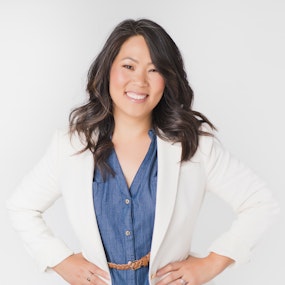
Jaime Greene
Solar Queen and Mom
Jaime Greene is a super mom of 3 young kids, married for 11 years and is known as The Solar Queen. She was adopted from Korea as an infant, grew up in Puyallup, Washington with two brothers and a sister. She had to grow up quickly when her parents divorced when she was 12 years old and her family split up. She began working to support herself at age 16, she found Jesus as her Savior, and at 18 went on to college only to drop out. At age 20, she began a decade long career at the Boeing Company traveling the globe for company work. In her mid twenties, she went through a divorce, serious health issues and bankruptcy during the real estate and financial crisis of 2008.
Shortly thereafter, she met her husband online, moved from Washington State to California, where she started a photography business, learned to trade the financial markets and started a private label brand that she sold on Amazon, all while starting and raising a family! Jaime and her husband Matt, live in the Bay Area and have 3 happy and healthy children and one baby in heaven. She has been helping businesses and homeowners make the transition from traditional energy to solar energy for the last 3 and a half years, saving her customers hundreds of thousands, and quite possibly millions of dollars collectively. Jaime is the Chief Commercial Officer of Uprisun Energy and a Loan Officer with Uprisun Capital of New York.
She is an avid learner, reader, traveler and has a small YouTube channel that provides solar education and information to her subscribers and viewers. She is a cour… Read More
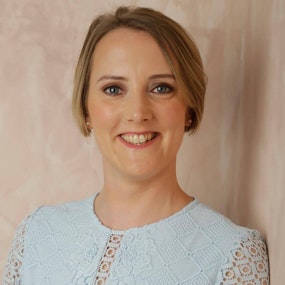
Dr Ruth Allan
Brain power & performance coach
Industry and family leaders hire Dr Ruth to win back their energy and time doing what they love by boosting their brain power and performance because most are chained to their past, don’t use the right tools and techniques and have never measured and optimised their unique brain.
Dr Ruth is a Certified Brain Health Professional and Trainer, High Performance and Trauma Recovery Coach, Motivational Speaker and Trainer.
In her spare time she’s a Reservist British Army Officer and military ski and mountain leader. She loves adventure and has been on expeditions to climb unclimbed peaks in Greenland as well as ski tour across the European Alps. She is married to Dave and has a daughter Lilly aged 3.
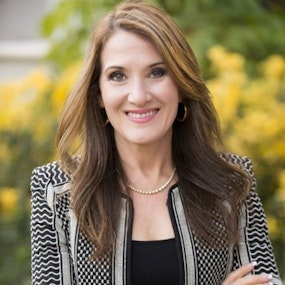
Dr. Caroline Leaf
Neuroscientist
Dr. Caroline Leaf is a communication pathologist and cognitive neuroscientist with a Masters and PhD in Communication Pathology and a BSc Logopaedics, specializing in cognitive and metacognitive neuropsychology. Since the early 1980s she has researched the mind-brain connection, the nature of mental health, and the formation of memory. She was one of the first in her field to study how the brain can change (neuroplasticity) with directed mind input.
Dr. Leaf is also the bestselling author of Switch on Your Brain, Think Learn Succeed, Cleaning Up Your Mental Mess, and many more. She teaches at academic, medical and neuroscience conferences, and to various audiences around the world.
Dr. Leaf is currently conducting clinical trials using the 5-step program she developed while in private practice to further demonstrate the effectiveness of mind-directed techniques to help relieve mental ill-health problems such as anxiety, depression and intrusive thoughts. The primary aim of these trials is to make mental health care more affordable, applicable, and accessible worldwide, and to reduce the stigma around mental health.
Welcome to The Think Unbroken Podcast!
Here are some of my favorite recent guests!






















